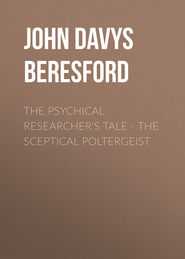По всем вопросам обращайтесь на: info@litportal.ru
(©) 2003-2024.
✖
The Jervaise Comedy
Автор
Год написания книги
2018
Настройки чтения
Размер шрифта
Высота строк
Поля
It was a tempting opening for a flirtation, but I could not flirt with her. When I had first heard the clear, soft tones of her voice at the window, I must have known that my meeting with her was a new and decisive experience. I had always idealised a certain type of woman, and perhaps for that reason I had always held back from the possible disillusions of an exploring intimacy. But my recognition of Anne had nothing in common with all my old deliberately romantic searchings for a theoretical affinity. If I had been asked at any time before two o’clock that morning to define my ideal, the definition would not have described Anne. Indeed, I could never have imagined her. She was altogether too individual, too positive, too independently real, to fit the mawkish vapourings of a man’s imaginary woman. There was something about her that conquered me. Already I was blushingly ashamed of my jealous suspicion that she could sell herself by a marriage with Jervaise. In all her moods, she appeared to me with an effect that I can only describe as “convincing.”
She was a perpetual revelation, and each new phase of her thrilled me with admiration, and a sense of long-sought satisfaction. I could be content to watch and to listen to her. The revelations of her personality were to me as a continual and glorious adventure. To flirt with her would be a confession on my part of a kind of superiority that I could never feel; a suggestion of the ridiculous assumption that I could afford to dally with and in certain circumstances flout her. I could sooner have dallied with and flouted a supreme work of art. Wherefore when she challenged me with her daring “Why?” I met her eyes with a look that if it in any way represented what I was feeling, must have expressed a grave and sincere humility.
“I can hardly tell you why,” I said. “I can only assure you that I am profoundly interested.”
She accepted that statement with a readiness that gave me another thrill of satisfaction. She understood my desire and gave way to it, instantly fulfilling my present need of her.
“My great-grandfather went back to Paris after things had settled down,” she went on, as if there had been no break in her narrative; “just as a common workman. He was about thirty-five, then, I believe; his first wife and his two children had died of small-pox in Holland, and he didn’t marry again until he was sixty. He had only one child afterwards; that was my grandmother. But I can’t tell you the story properly. You must get my mother to do that. She makes such a lovely romance out of it. And it is rather romantic, too, isn’t it? I like to feel that I’ve got that behind me rather than all the stodgy old ancestors the Jervaises have got. Wouldn’t you?”
“Rather,” I agreed warmly.
“If I didn’t miss all the important points you’d think so,” Anne replied with a little childish pucker of perplexity coming in her forehead. “But story-telling isn’t a bit in my line. I wish it were. I can listen to mother for hours, and I can never make out quite what it is she does to make her stories so interesting. Of course she generally tells them in French, which helps, but I’m no better in French than in English. Mother has a way of saying ‘Enfin’ or ‘En effet’ that in itself is quite thrilling.”
“You don’t know quite how well you do it yourself,” I said.
She shook her head. “Not like mother,” she asserted. With that childish pucker still wrinkling her forehead she looked like a little girl of fourteen. I could see her gazing up at her mother with some little halting perplexed question. I felt as if she were giving me some almost miraculous confidence, obliterating all the strangeness of new acquaintanceship by displaying the story of her girlhood.
“She puts mystery into it, too,” she went on, still intent on the difference between her own and her mother’s methods. “And, I think, there really is some mystery that she’s never told us,” she added as an afterthought. “After my grandfather died, her mother married again, a widower with one little girl, and when she grew up mother got her over here as a sort of finishing governess to Olive Jervaise. She came a year or two before Brenda was born. She was born in Italy. Did you know that? I always wonder whether that’s why she’s so absolutely different from all the others.”
“She certainly is. I don’t know whether that’s enough to explain it,” I commented. “And did your mother’s step-sister go abroad with them?”
“I believe so. She never came back here afterwards. She has been dead for ages, now. But mother’s always rather mysterious about her. That’s how I began, wasn’t it? I know that she was very beautiful, and sometimes I think I can just remember her. I must have been about four when she left here, because I’m rather more than four years older than Brenda.”
The thought of Anne at four was not less fascinating to me than the picture of her at fourteen. I was jealous of all her twenty-three years of life. I wanted to have an intimate knowledge of all her past being; of every least change and development that she had suffered since babyhood.
But I was to have no more confidences of that sort just then. The child disappeared from her face and speech as quickly as it had come. She appeared to be dreaming, again, as she continued almost without a pause,—
“But it isn’t my mother I’m sorry for in this affair. She’ll arrange herself. I think she’ll be glad, in a way. We all should if it weren’t for my father. We’re so ruled by the Jervaises here. And it’s worse than that. Their—their prestige sort of hangs over you everywhere. It’s like being at the court of Louis Quatorze. The estate is theirs and they are the estate. Mother often says we are still féodal down here. It seems to me sometimes that we’re little better than slaves.”
I smiled at the grotesqueness of the idea. It was impossible to conceive Anne as a slave.
She was still gazing out of the window with that appearance of abstraction, but she was evidently aware of my smile, for she said,—
“You think that’s absurd, do you?”
“In connection with you,” I replied. “I can’t see you as any one’s slave.”
She gave me her attention again. “No, I couldn’t be,” she threw at me with a hint of defiance; and before I had time to reply, continued, “I was angry with Arthur for coming back. To go into service! I almost quarrelled with mother over that. She was so weak about it. She hated his being so far away. She didn’t seem to mind anything as long as she could get him home again. But Arthur’s more like my father. He’s got a strain of Jervaise-worship in him, somewhere.”
“A very strong strain, just now,” I suggested.
She laughed. “Yes, he’s Brenda’s slave; always will be,” she said. “But I don’t count her as a Jervaise. She’s an insurgée like me—against her own family. She’d do anything to get away from them.”
“Well, she will now,” I said, “and your brother, too.”
That seemed to annoy her. “It may sound easy enough to you,” she said, “but it’s going to be anything but easy. You can’t possibly understand how difficult it’s going to be.”
“Can’t you tell me?” I asked.
She shrugged her shoulders as if she had suddenly become tired of my questions, perhaps of myself, also.
“You’re so outside it all,” she said.
“I know I am,” I admitted. “But—I don’t want to remain outside.”
“I don’t know why I’ve been telling you as much as I have,” she returned.
“I can only plead my profound interest,” I said.
“In Arthur? Or in us, generally?” she inquired and frowned as if she forbade me to say that my chief interest might be in herself.
“In all of you and in the situation,” I tried, hoping to please her. “I was prepared to dislike the Jervaises and all they stood for, before this talk with you. Now…”
“But you’re well off, aren’t you?” she said with a faint air of contempt. “You can’t be an insurgé. You’d be playing against your own side.”
“If you think that, why did you give me so much confidence to begin with?” I retaliated.
“Oh! I’m always doing silly things,” she said. “It was silly to play with that foolish Jervaise man this morning. It was silly to offend him this evening. I don’t—think. I ought to be whipped.” She had apparently forgotten her recent distrust of me, for she continued in the tone of one who makes an ultimate confession. “As a matter of fact, I suppose I’m chiefly responsible for the whole thing. I egged them on. Arthur would have gone on adoring Brenda as a kind of divinity for ever, if I hadn’t brought them together. He’s afraid to touch her, even now. I just didn’t think. I never do till it’s too late.”
“But you’re not sorry—about them, are you?” I put in.
“I’m sorry for my father,” she said. “Oh! I’m terribly sorry for him.” Her eyes were extraordinarily tender and compassionate as she spoke. I felt that if any lover of Anne’s could ever inspire such devotion as showed in her face at that moment, he would indeed be blest.
“He’s sixty,” she went on in a low, brooding voice, “and he’s—he’s so—rooted.”
“Is there no chance of their letting you stay on, if Arthur and Brenda went to Canada?” I asked.
Her face was suddenly hard again as she replied. “I don’t think there’s one chance in a million,” she said. “The Jervaise prestige couldn’t stand such relations as us, living at their very doors. Besides, I know I’ve upset that horrid Jervaise man. He’ll be revengeful. He’s so weak, and that sort are always vindictive. He’ll be mean and spiteful. Oh! no, it’s one of two things, either Arthur will have to go back to Canada without Brenda, or we’ll all have to go together.”
Her tone and attitude convinced me. If I had been able to consider the case logically and without prejudice, I should probably have scorned this presentation of rigid alternatives as the invention of a romantic mind; I might have recognised in it the familiar device of the dramatist. But I had so far surrendered myself to the charm of Anne’s individuality that I accepted her statement without the least shadow of criticism. It was the search to find some mechanical means of influencing the Jervaises’ decision that reminded me of Arthur Banks’s hint of an advantage that he might use in a last emergency.
“But your brother told me last night,” I said, “that there was some—‘pull’ or other he had, that might make a difference if it came to desperate measures.”
“He didn’t tell you what it was?” she asked, and I knew at once that she was, after all, in her brother’s confidence.
“No, he gave me no idea,” I replied.
“He couldn’t ever use that,” she said decidedly. “He told me about it this morning, before he went up to the Hall, and I—”
“Dissuaded him?” I suggested, as she paused.
“No! He saw it, himself,” she explained.
“It wasn’t like Arthur—to think of such a thing, even—at ordinary times. But after his quarrel with Brenda on the hill—if you could call it a quarrel, when, so far as I can make out, Arthur never said a word the whole time—after that, and Brenda being so eager to face them all out, this morning; he got a little beyond himself.”
“Does Brenda know about this—pull?” I asked.
“Of course not!” Anne replied indignantly. “How could we tell her that?”
She was a perpetual revelation, and each new phase of her thrilled me with admiration, and a sense of long-sought satisfaction. I could be content to watch and to listen to her. The revelations of her personality were to me as a continual and glorious adventure. To flirt with her would be a confession on my part of a kind of superiority that I could never feel; a suggestion of the ridiculous assumption that I could afford to dally with and in certain circumstances flout her. I could sooner have dallied with and flouted a supreme work of art. Wherefore when she challenged me with her daring “Why?” I met her eyes with a look that if it in any way represented what I was feeling, must have expressed a grave and sincere humility.
“I can hardly tell you why,” I said. “I can only assure you that I am profoundly interested.”
She accepted that statement with a readiness that gave me another thrill of satisfaction. She understood my desire and gave way to it, instantly fulfilling my present need of her.
“My great-grandfather went back to Paris after things had settled down,” she went on, as if there had been no break in her narrative; “just as a common workman. He was about thirty-five, then, I believe; his first wife and his two children had died of small-pox in Holland, and he didn’t marry again until he was sixty. He had only one child afterwards; that was my grandmother. But I can’t tell you the story properly. You must get my mother to do that. She makes such a lovely romance out of it. And it is rather romantic, too, isn’t it? I like to feel that I’ve got that behind me rather than all the stodgy old ancestors the Jervaises have got. Wouldn’t you?”
“Rather,” I agreed warmly.
“If I didn’t miss all the important points you’d think so,” Anne replied with a little childish pucker of perplexity coming in her forehead. “But story-telling isn’t a bit in my line. I wish it were. I can listen to mother for hours, and I can never make out quite what it is she does to make her stories so interesting. Of course she generally tells them in French, which helps, but I’m no better in French than in English. Mother has a way of saying ‘Enfin’ or ‘En effet’ that in itself is quite thrilling.”
“You don’t know quite how well you do it yourself,” I said.
She shook her head. “Not like mother,” she asserted. With that childish pucker still wrinkling her forehead she looked like a little girl of fourteen. I could see her gazing up at her mother with some little halting perplexed question. I felt as if she were giving me some almost miraculous confidence, obliterating all the strangeness of new acquaintanceship by displaying the story of her girlhood.
“She puts mystery into it, too,” she went on, still intent on the difference between her own and her mother’s methods. “And, I think, there really is some mystery that she’s never told us,” she added as an afterthought. “After my grandfather died, her mother married again, a widower with one little girl, and when she grew up mother got her over here as a sort of finishing governess to Olive Jervaise. She came a year or two before Brenda was born. She was born in Italy. Did you know that? I always wonder whether that’s why she’s so absolutely different from all the others.”
“She certainly is. I don’t know whether that’s enough to explain it,” I commented. “And did your mother’s step-sister go abroad with them?”
“I believe so. She never came back here afterwards. She has been dead for ages, now. But mother’s always rather mysterious about her. That’s how I began, wasn’t it? I know that she was very beautiful, and sometimes I think I can just remember her. I must have been about four when she left here, because I’m rather more than four years older than Brenda.”
The thought of Anne at four was not less fascinating to me than the picture of her at fourteen. I was jealous of all her twenty-three years of life. I wanted to have an intimate knowledge of all her past being; of every least change and development that she had suffered since babyhood.
But I was to have no more confidences of that sort just then. The child disappeared from her face and speech as quickly as it had come. She appeared to be dreaming, again, as she continued almost without a pause,—
“But it isn’t my mother I’m sorry for in this affair. She’ll arrange herself. I think she’ll be glad, in a way. We all should if it weren’t for my father. We’re so ruled by the Jervaises here. And it’s worse than that. Their—their prestige sort of hangs over you everywhere. It’s like being at the court of Louis Quatorze. The estate is theirs and they are the estate. Mother often says we are still féodal down here. It seems to me sometimes that we’re little better than slaves.”
I smiled at the grotesqueness of the idea. It was impossible to conceive Anne as a slave.
She was still gazing out of the window with that appearance of abstraction, but she was evidently aware of my smile, for she said,—
“You think that’s absurd, do you?”
“In connection with you,” I replied. “I can’t see you as any one’s slave.”
She gave me her attention again. “No, I couldn’t be,” she threw at me with a hint of defiance; and before I had time to reply, continued, “I was angry with Arthur for coming back. To go into service! I almost quarrelled with mother over that. She was so weak about it. She hated his being so far away. She didn’t seem to mind anything as long as she could get him home again. But Arthur’s more like my father. He’s got a strain of Jervaise-worship in him, somewhere.”
“A very strong strain, just now,” I suggested.
She laughed. “Yes, he’s Brenda’s slave; always will be,” she said. “But I don’t count her as a Jervaise. She’s an insurgée like me—against her own family. She’d do anything to get away from them.”
“Well, she will now,” I said, “and your brother, too.”
That seemed to annoy her. “It may sound easy enough to you,” she said, “but it’s going to be anything but easy. You can’t possibly understand how difficult it’s going to be.”
“Can’t you tell me?” I asked.
She shrugged her shoulders as if she had suddenly become tired of my questions, perhaps of myself, also.
“You’re so outside it all,” she said.
“I know I am,” I admitted. “But—I don’t want to remain outside.”
“I don’t know why I’ve been telling you as much as I have,” she returned.
“I can only plead my profound interest,” I said.
“In Arthur? Or in us, generally?” she inquired and frowned as if she forbade me to say that my chief interest might be in herself.
“In all of you and in the situation,” I tried, hoping to please her. “I was prepared to dislike the Jervaises and all they stood for, before this talk with you. Now…”
“But you’re well off, aren’t you?” she said with a faint air of contempt. “You can’t be an insurgé. You’d be playing against your own side.”
“If you think that, why did you give me so much confidence to begin with?” I retaliated.
“Oh! I’m always doing silly things,” she said. “It was silly to play with that foolish Jervaise man this morning. It was silly to offend him this evening. I don’t—think. I ought to be whipped.” She had apparently forgotten her recent distrust of me, for she continued in the tone of one who makes an ultimate confession. “As a matter of fact, I suppose I’m chiefly responsible for the whole thing. I egged them on. Arthur would have gone on adoring Brenda as a kind of divinity for ever, if I hadn’t brought them together. He’s afraid to touch her, even now. I just didn’t think. I never do till it’s too late.”
“But you’re not sorry—about them, are you?” I put in.
“I’m sorry for my father,” she said. “Oh! I’m terribly sorry for him.” Her eyes were extraordinarily tender and compassionate as she spoke. I felt that if any lover of Anne’s could ever inspire such devotion as showed in her face at that moment, he would indeed be blest.
“He’s sixty,” she went on in a low, brooding voice, “and he’s—he’s so—rooted.”
“Is there no chance of their letting you stay on, if Arthur and Brenda went to Canada?” I asked.
Her face was suddenly hard again as she replied. “I don’t think there’s one chance in a million,” she said. “The Jervaise prestige couldn’t stand such relations as us, living at their very doors. Besides, I know I’ve upset that horrid Jervaise man. He’ll be revengeful. He’s so weak, and that sort are always vindictive. He’ll be mean and spiteful. Oh! no, it’s one of two things, either Arthur will have to go back to Canada without Brenda, or we’ll all have to go together.”
Her tone and attitude convinced me. If I had been able to consider the case logically and without prejudice, I should probably have scorned this presentation of rigid alternatives as the invention of a romantic mind; I might have recognised in it the familiar device of the dramatist. But I had so far surrendered myself to the charm of Anne’s individuality that I accepted her statement without the least shadow of criticism. It was the search to find some mechanical means of influencing the Jervaises’ decision that reminded me of Arthur Banks’s hint of an advantage that he might use in a last emergency.
“But your brother told me last night,” I said, “that there was some—‘pull’ or other he had, that might make a difference if it came to desperate measures.”
“He didn’t tell you what it was?” she asked, and I knew at once that she was, after all, in her brother’s confidence.
“No, he gave me no idea,” I replied.
“He couldn’t ever use that,” she said decidedly. “He told me about it this morning, before he went up to the Hall, and I—”
“Dissuaded him?” I suggested, as she paused.
“No! He saw it, himself,” she explained.
“It wasn’t like Arthur—to think of such a thing, even—at ordinary times. But after his quarrel with Brenda on the hill—if you could call it a quarrel, when, so far as I can make out, Arthur never said a word the whole time—after that, and Brenda being so eager to face them all out, this morning; he got a little beyond himself.”
“Does Brenda know about this—pull?” I asked.
“Of course not!” Anne replied indignantly. “How could we tell her that?”








